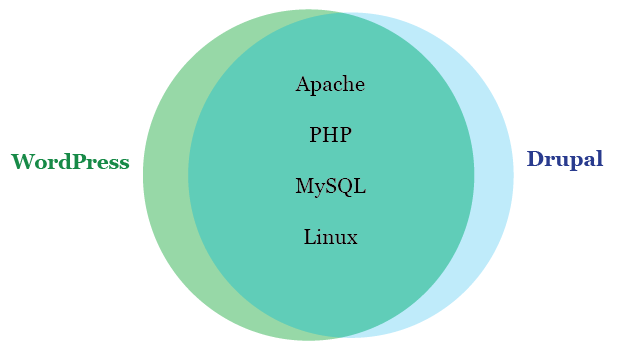Every week I hear about someone choosing WordPress over Drupal (or vice versus). While there are certainly differences between the two platforms, they are more alike than people typically care to admit:
- Both are used as content management systems.
- Both are written in PHP
- Both are optimized for the LAMP stack.
- Both are free open source.
- Both are supported by massive and highly active communities
- Both are significantly better than the traditional closed source alternatives that are still entrenched in the enterprise.
For the visually inclined the overlap of just the LAMP stack is shown here:

The Alternative
Not only is Open Source free of licensing fees, but it is also better than closed source licensed software. A perfect example can be found by looking at the failed Healthcare exchange that Oregon contracted with Oracle to create. Even now in February when visiting the website in Chrome I am prompted to "use Safari" if I want to submit my application online:

I'm sorry did you just prompt me to open a new browser, despite me using a perfectly capable modern browser? Oracle, 1999 called and they want their technology back.
Following the Money
Oregon paid Oracle $90MM dollars (and may owe another $69MM) for a website that failed to launch on time and doesn't work. There are open source powered solutions that support millions* of users (we've supported single nights of traffic of over 2 million page views) and yet billions of dollars is being paid out for technology that is failing. How much money?
* The total population in Oregon is 3.899 million.
In 2013 Oracle brought in $37B - that's just the company, not individuals and other businesses consulting on the technology. In the same year, SAP posted revenues of $22B. It is THESE dollars along with the others being spent in the closed source and license-based technology economy that can, should and will be put to better use when they are invested in open source.
Speak Well of One Another
The next time you are invited to share your opinion on WordPress or Drupal (or another open source platform) I encourage you to speak kindly. Whether a particular project is decided to be built on WordPress or Drupal it is a win for open source and the LAMP stack. In both of these cases the company or entity making this investment will see a huge return on their investment when compared to closed source, so these choices should be celebrated by both sides.
It is the hundreds of thousands (and even millions) of dollars needlessly thrown into licensing platforms build 10 to 20 years ago that should cause to shake our heads and sigh. Let's come together to help make sure dollars are invested where all of our customers will see the best return.